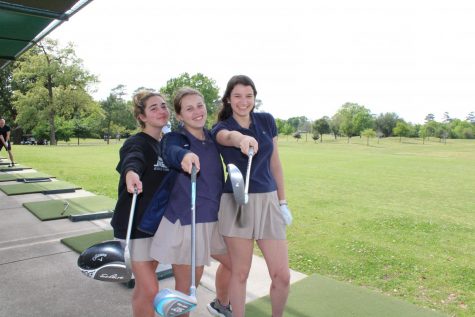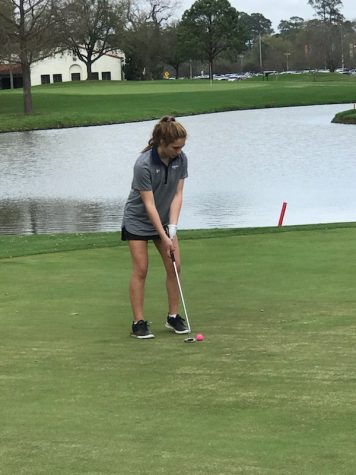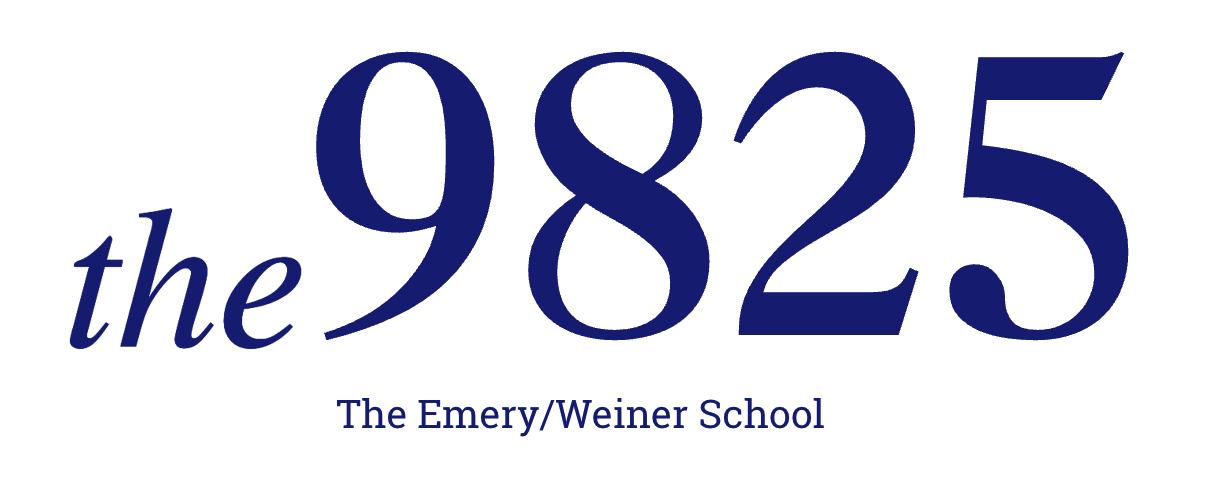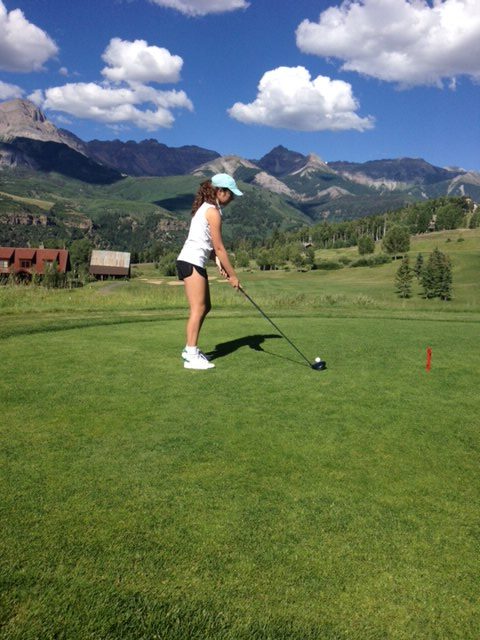Notes of a High School Golfer
May 29, 2019
Freshman year; I stand paralyzed in the hallway and peppered with questions. Hefty golf bag slung over my shoulder, I am en route to the stairwell where I hide my clubs during the school day. My peers stare at me. Getting to school before 7:45 is the only acceptable time to come, as most students haven’t arrived at school yet and there is time to lug my golf bag from the door to the stairs without being spotted. Today, I was not on time.
I’d made the common mistake of sleeping in, yet only I had to pay an uncommon price. I pass my peers on my less than sneaky walk to the stairwell, and my fears come true as they stop me, turn up their noses, and ask the daunting questions: “You play golf? Is that even a sport?” I scramble for an answer, wondering what response could impress someone who so adamantly refuses to be impressed by my sport. Their eyes bore through me as if they’re ready to dismiss and diminish anything I can say about my feeling towards golf. I’m a deer in the headlights: there are endless answers that range from the technically correct to an answer that conforms to my classmates’ opinions.
Golf is an individual sport, also known as a cut throat competition. A high school golf tournament entails students competing for the lowest score against students from other schools as well as their own. There is no working together. The self reliance can be toxic; players do not look out for each other. The game wedges itself between a player and their team and a player and their competitors. There is absolutely no one to lean on.

Golf is a game of skill, perfect aim, and trusting no one. Tournaments have an aura of intensity surrounding them. The minute a player steps foot on the course, all bets are off. Team members try to get under each others’ skin, making subtle and faux playful jokes about their abilities and past scores. Players venture out to intimidate and psych out their competition. There are those who wear two gloves, a known sign of great skill considering most players only wear one glove on their non dominant hand. While these players seem untouchable, there are ways of getting in their heads. If the player is humble and one were to ask, “Why are you wearing two gloves?” or “Do you blister easily?” that would surely shake them. The likelihood of shaking a player wearing two gloves, I must admit, is slim. It’s most probable that these cocky few will laugh or shrug off the questions without so much as justifying the inquiry with a response.
It’s imperative that you do not show vulnerability in your playing group. These are the three people you spend six hours of your day with. This is an extremely long amount of time to spend with three strangers who only want to throw you off your game. It’s normal to be chatty, since it makes the passing time feel faster. Talking with your teammates is risky, since you don’t know them well. You don’t know what they like to do, how open to be, how much to talk, or what makes them laugh. You don’t know if they want to check their phone or if you can curse in front of them. The tricky thing about exposing your personality is when someone bashes the way you present yourself or how many words you use. These jabs at your personality can throw your focus. You start to beat yourself up. “Why am I like this? What made me think it was ok to be myself around these people I barely know?” Your group members have done it. They’re in your head.
 These players watch your every move. Golf is a game of integrity, and at the end of every hole you have to count your strokes and tell your playing partners. If you so much as leave off a stroke because you forget it, and say you shoot a five instead of a six, instantly you can be disqualified. This is called “shaving your score” – making your score seem lower than it is, or put simply, cheating. However, if you unintentionally put down the wrong score, silly mistake like that costs you the rest of the tournament, and a chance at medalling at the end of the tournament. Some players will try to “help” you by asking, “Is this your sixth stroke?” Some might start to sweat and say yes instinctively. Even if it is not your sixth stroke and it’s your fifth, what you have done is added a point to your score, enabling your fellow players to shoot lower than you. This trick, disguised as an innocent question, is meant to stress you out. Now, when you move to take your shot you have to refocus. However, this focussing, including practice swings and slow breathes, takes time and could slow down the pace of play. Tournaments frown upon slow play and usually give time limits per holes, such as 15 to 20 minutes playing each hole.
These players watch your every move. Golf is a game of integrity, and at the end of every hole you have to count your strokes and tell your playing partners. If you so much as leave off a stroke because you forget it, and say you shoot a five instead of a six, instantly you can be disqualified. This is called “shaving your score” – making your score seem lower than it is, or put simply, cheating. However, if you unintentionally put down the wrong score, silly mistake like that costs you the rest of the tournament, and a chance at medalling at the end of the tournament. Some players will try to “help” you by asking, “Is this your sixth stroke?” Some might start to sweat and say yes instinctively. Even if it is not your sixth stroke and it’s your fifth, what you have done is added a point to your score, enabling your fellow players to shoot lower than you. This trick, disguised as an innocent question, is meant to stress you out. Now, when you move to take your shot you have to refocus. However, this focussing, including practice swings and slow breathes, takes time and could slow down the pace of play. Tournaments frown upon slow play and usually give time limits per holes, such as 15 to 20 minutes playing each hole.
The high stakes environment makes or breaks a player’s spirit. Personally, golf makes me emotionally fragile. My non-golfer peers do not understand the weight golf places on my shoulders. Getting involved in the golf program is a slippery slope. I started off not caring about the sport at all, not minding if my swing was off. Now, the more I practice on the driving range, the better my swing gets. My aim improves and I practice hitting towards certain objects I see on the range. Despite all my efforts, there are a few swings or puts that put my score over the edge (the edge being par). My shot will go too far to the right, so much so that it’s out of bounds. It’s as if my ball has a secret plot against me, landing in a bush yet still rendering me unable to take a lateral hazard drop without a one stroke penalty. I find myself, already worked up about my mishit, turning my frustration into sadness. I will either hit a shot that does not position me any closer to the green and will only allow me an escape from from the bush, or I will take a penalty stroke to drop my ball a club length away from the bush. No matter the path I choose, it all goes back to the awful shot I hit.
One bad shot tears me up. I get angry at myself. I feel overwhelmingly depressed. I get tired. I get tired because I’m swinging my arms constantly, walking in the blazing sun for six hours, and getting sunburnt all over my arms and legs, all while carrying thirty pounds on my back. My body is worn out. My mind is all over the place. I beat myself up over the shots that aren’t pleasing. I beat myself up when others do better than I do. I beat myself up when I see scores lower than mine place.
To simply state it, I fully believe golf makes me depressed.
Why do I play it? Why do I keep going? Because golf tests my strength like nothing else. Before I started playing on the team I never believed I could play all 18 holes, let alone walk them. Golf gives me an emotional and mental rush that I have to evaluate and push through. I switch from being in my head to getting out of it. Playing golf teaches me my insecurities personally and teaches me what I need to work on golf wise. Golf is so much more than a game. It’s time to focus on yourself under pressure. It’s a physical game and a mind game.
I watch golf when I’m running on the treadmill. The intensity is overwhelming, even from a screen. The players’ emotions aren’t understood by non- golfers. Golf is an emotional rollercoaster of very high highs and catastrophically low lows. The elation on a professional player’s face on the screen when they shoot an eagle or a birdie on a hole is the same feeling high school players get when they shoot a par or a birdie on a hole. A mishit for anyone crushes their spirit. The game is consuming. The game is entertaining. You never know what you’re going to see.
One day, I was running and watching golf at the same time. I watched Tiger Woods hit a terrible shot, landing left of the fairway and right behind a boulder. Soon, around 10 men flanked the boulder and lifted it away from Woods’ ball so that he could continue playing the hole. It was a roller coaster. Woods was frustrated, then pensive examining the boulder, then laughing as the men lifted it out of his way. None of my peers think to watch golf when exercising and laugh as I tell them it’s something I enjoy doing. They say it’s not motivating. For me, watching golf and playing golf is the same as someone who plays soccer watching soccer on tv. There is the same level of motivation, but you rely only on yourself and your abilities instead of support from your team. This makes it even more challenging and emotionally charging.
In high school, golf is treated as less than a sport. And maybe it’s not one, not in the way the kids at the stairwell that day understood a sport to be. It is a rollercoaster of emotion, strains, elation, exhaustion, struggle, crashing down, building yourself back up. It is love. It is golf.


